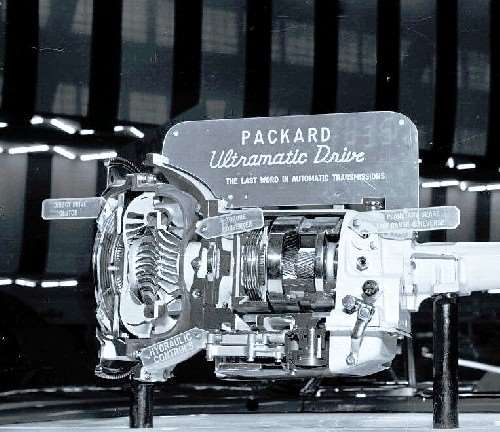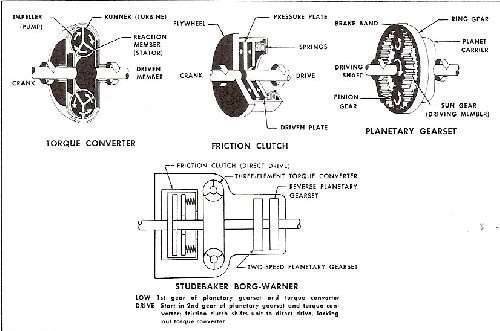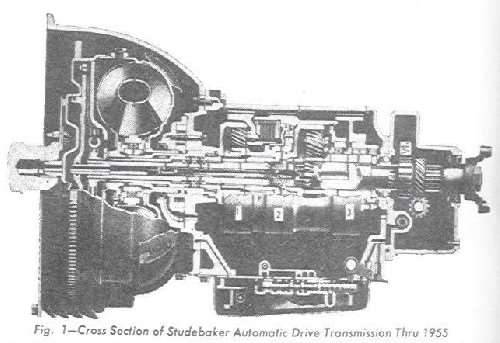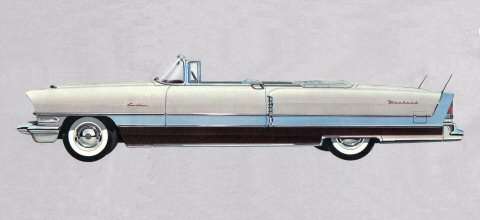|
Re: Ultramatic by Borg-Warner?
|
||||
|---|---|---|---|---|
|
Home away from home
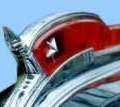
|
Steve, before getting lost in the shuffle I try to bump your post back on surface.
[source: automaattivaihdepori.fi] Click to enlarge!
Posted on: 2014/12/31 16:50
|
|||
|
The story of ZIS-110, ZIS-115, ZIL-111 & Chaika GAZ-13 on www.guscha.de
|
||||
|
||||
|
Re: Ultramatic by Borg-Warner?
|
||||
|---|---|---|---|---|
|
Home away from home

|
Here is a diagram of the trans that Studebaker co-developed with Borg-Warner's Detroit Gear division: two speed planetary gearset with torque converter lockout. Sounds familiar, eh?
From my reading, the DG transmission was very highly regarded in it's day. Interesting how the timeline works out. The Studebaker "Automatic Drive" trans was introduced in 50. Packard and Studebaker merge in October 54, with one of the expected synergies being using the Ultramatic in V8 Studebakers, rather than the B-W trans. In January of 55, Nance is complaining about B-W pushing him to sell Packard's Ultramatic production capability, and buying B-W transmissions instead. Later in 55, B-W announces to Studebaker there will be a large price increase for the DG transmission. For reasons of cost, Studebaker rejects both the DG and the Ultramatic and switches to the cheaper trans produced by B-W's Warner Gear division. If it wasn't for the big price increase on the DG, I would figure B-W's offer was motivated as much by trying to retain the Studebaker account as it was by trying to gain the Packard account as both accounts were expected to hinge on availability of the Ultramatic. The time line of Nance rejecting the offer and the price increase changes the scenario. Was B-W artificially holding the price down on the DG to try and induce Packard to scrap the Ultramatic in it's favor? Or, did B-W inflate the price increase on the DG to punish S-P for rejecting it's buyout offer for the Ultramatic? Or, was B-W planning the price increase all along and hoping to leave S-P with no choice but accepting the increase by eliminating the Ultramatic? I get the impression that Langworth is trying to make it sound like Nance made a mistake by passing on the B-W offer, but, as events played out, I would say that any paranoia Nance may have harbored about abandoning the company's fate to the whims of a subcontractor, again, was justified.
Posted on: 2014/12/31 20:09
|
|||
|
||||
|
Re: Ultramatic by Borg-Warner?
|
||||
|---|---|---|---|---|
|
Home away from home

|
Quote:
This is a very interesting discovery! I have a technical question, though. Was the "torque converter lockout" of the Detroit Gear transmission an actual locking system with clutches, as the Twin Ultramatic? If not, was the locking torque converter in the TU a big leap anticipated by Borg-Warner, and possibly a cause of their interest in the Ultramatic? To my knowledge, no locking torque converter automatic transmission was available again until Chrysler did it in 1979 or so. Of course, today there's hardly an automatic transmission made without a locking torque converter. Gee, would that mean that Packard had it first by 14 or 15 years, and now it's the industry standard? Sounds like Packard.
Posted on: 2014/12/31 22:00
|
|||
|
Guy
Not an Expert |
||||
|
||||
|
Re: Ultramatic by Borg-Warner?
|
||||
|---|---|---|---|---|
|
Home away from home

|
Quote:
As I read the notes at the bottom of the scan I posted, the DG works exactly like the original Ultramatic prior to the "Gear Start" of 54 and the TU of 55. Operation as described by Langworth: "In the drive position, the gearbox provided two automatically shifted forward speeds, starting in second, or intermediate with torque multiplication assisted by the converter. For a third speed, the friction clutch was hydraulically engaged, the converter and planetary gears cut out after driveshaft speed and throttle opening were in correct configuration. Manual downshifting from top to second was possible at speeds lower than 50mph by flooring the accelerator, while the "low" position embodied manual gear hold for fast takeoffs or engine braking, during which torque was transmitted by the hydraulic converter and planetary gearset." The transmission was air cooled and incorporated an anti-creep device that held pressure in the rear brakes. Stepping on the accelerator released the brake pressure. This anti-creep device was also used as the "hill holder" on manual shift Studebakers. As I understand the Ultramatic, the only major difference between the earlier models, vs the gear start and TU is that, having observed that owners were starting in low to get off the line faster, then manually shifting into "drive". The gear start and TU automated that low/drive upshift. A feature that B-W could probably have incorporated into the DG as easily as Packard did with the Ultramatic.
Posted on: 2014/12/31 22:33
|
|||
|
||||
|
Re: Ultramatic by Borg-Warner?
|
||||
|---|---|---|---|---|
|
Home away from home

|
Actually the Borg-Warner trans had three speeds with Low being another ratio selected manually. This was the practice with BW equipped Fords until the three speed adaption of the same trans. However on Ford, selecting D2 provided a second gear breakaway for reduced wheel spin. This feature gave Fords a takeoff much like the TU in Drive range - slush box effect.
When I was a kid I had an old Ford with the BW two speed. I didn't know that low was a separate range and used to slam the thing into low at highway speeds. The motor would spin so fast that it would overrun the power steering pump and scream. In retrospect those old Ford V-8's were very rugged because all that abuse never affected that motor (292 deep block V-8). As for Nance and sunk costs, that principle is valid only in the absence of loss recognition. If banks are loaning money for plant and equipment, what impression would they get if those funds were amortized immediately as losses? Sure, if money has been wasted it cannot be recovered which is about all "the principle of sunk costs" represents. However, in the real world, earnings have to be managed and not all results are going to be favorable. These college professors should stick to their egotistical delusions and stop trying to screw up our financial system vis a vis phony costs of capital, welfare for the rich, and systemic corruption.
Posted on: 2015/1/1 7:13
|
|||
|
||||
|
Re: Ultramatic by Borg-Warner?
|
||||
|---|---|---|---|---|
|
Home away from home

|
Quote:
Whether the Ultramatic equipment was fully amortized or not, the cash was no longer on the balance sheet. A bank evaluating a loan would look at ability to pay back the loan. Amortization is really a tax management strategy, and does not affect the value of the assets being amortized. What is interesting is the way B-W tried to lock Packard into buying the DG by buying the Ultramatic line, with a large price increase on the DG only a few months in the future. What possible use could B-W have for the Ultramatic equipment, other than to deny it's use to Packard? The entire transmission scenario plays out like the Briggs bodybuilding scenario, where Max Gilman not only outsourced bodybuilding, but handed all Packard's bodybuilding equipment over to Briggs. In the Briggs scenario, it appears that Packard received an attractive price on bodies, for a couple years. After the war, Briggs was doing Packard no favors on price or quality. According to Ward, Nance started looking at bringing bodybuilding in house soon after arriving on E Grand. The finance department estimates were showing significant savings by building bodies in house, but the capital expense to buy equipment to replace what Gilman had handed to Briggs was prohibitive. Not knowing about the B-W price increase, Nance was probably looking at the Briggs experience and was suspicious of B-W escalating prices, the way Briggs had, and the possibility of B-W outright selling it's automotive transmission division to Ford, which could deny Packard access to transmissions the same way Chrysler wanted to cut off their access to body assembly. Langworth only published excerpts from the memos between Nance and Graves, and he does not provide hard numbers regarding the cost of the Ultramatic vs the DG before and after the price increase, so I don't know if Nance had expressed these concerns about buying the DG, or if the DG would still have been cheaper than the Ultramatic after the price increase. There is enough however, for me to question B-W's motives, and give Nance credit for not falling into a potential trap. Quote: Actually the Borg-Warner trans had three speeds with Low being another ratio selected manually. B-W had two divisions producing automatics. The early Studebaker trans, which resembled the Ultramatic, was made by the Detroit Gear division. The cheaper automatic, which B-W shared with Ford, was produced by the Warner Gear division, and was a three speed, without the torque converter lockup. The Studebaker version was called "Flight-O-Matic", and test reports from the late 50s are sometimes less than complimentary regarding it's operation.
Posted on: 2015/1/1 12:14
|
|||
|
||||
|
Re: Ultramatic by Borg-Warner?
|
||||
|---|---|---|---|---|
|
Home away from home

|
Hi Steve203
My read of the situation with Borg-Warner offering to take over the Ultramatic tooling, becoming their transmission supplier was the second prong of a two-tier approach for S-P business. Detroit Gear produced the Automatic Drive for Studebaker only, concurrent to the Warner Gear Ford-O-Matic production. Without actual sales numbers to compare, its still easy enough to conclude Borg-Warner was trying to consolidate all their production on the higher volume units. From Studebaker's highest calendar year 1950 of 268,099 cars, by the time of these negotiation after the dismal 85,660 1954's, B-W was justified trying to get S-P to consolidate on the higher volume/lower unit cost transmission. Studebaker did just that for 1956, substituted the Warner Gear Flight-O-Matic for Automatic Drive. Functionally, it probably was inferior to Automatic Drive but for most buyers the difference was transparent. The price hike was simply an inducement to get them to accept the more popular unit. B-W then shipped the Automatic Drive tooling off to England where their operation manufactured it for use in Jaguars. The same gambit was being tried on the Packard-Clipper Division, B-W had developed a heavier duty version of the basic Ford-O-Matic, named Turbo-Drive which took the place of Hydramatic in the 1955 Lincoln. After some initial teething problems, it developed into a serviceable unit used in Lincolns into the 1960's. As Lincoln's volume ranged around 25K-30K units annually, the addition of Packard and Clippers business would have made it a more cost-affective propositon. The logic ran that a transmission capable of handling the torque of a Lincoln 341/368 would also be adequate for a Packard 320/352/374. Whether Packard was making any money producing its Ultramatic transmission is debatable. To sell cars in that segment, it had to have an automatic but whether it had to be of their own manufacture is the question. Most buyers had no idea who made the automatic transmission in their car, only cared if it worked properly and dependably. Nance may well have been wary of getting into the same situation for automatic tranmissions as they had been for bodies. But, unlike the dependence on Briggs-Chryslers which had developed into a less-than-desirable situation, B-W as an industry transmission supplier had no valid reason to cut off supplies capriciously. They gladly built all there was demand for by Ford and AMC.....and Studebaker......and Packard if they could have. I'll let others debate the relative operational merits of each transmission. But will say that none was perfect. Steve
Posted on: 2015/1/1 16:19
|
|||
|
||||
|
Re: Ultramatic by Borg-Warner?
|
||||
|---|---|---|---|---|
|
Home away from home

|
Quote:
According to Langworth, the DG's development was a joint venture between B-W and Studebaker, which gave Studebaker some authority over it's use. When the DG came out, Ford wanted it too, but Studebaker vetoed it, so Ford went to the Warner division to develop the Ford-O-Matic instead. Langworth speculates that, had Studebaker not vetoed the Ford offer, the DG would have been produced in higher quantity and Studebaker might not have been faced with the price increase. The Wiki entry for the Lincoln Capri says the Turbo-Drive was built by Ford, not B-W. If Wiki is correct, then there would be no economies of scale for B-W building a version of the Turbo-Drive for Packard. Apparently production of the Ford-O-Matic was split between Ford and B-W. Packard's real problem re bodies was not so much a capricious move by Briggs, though Briggs didn't appear to be doing Packard any favors. It was a capricious move by Chrysler. Recall that Chrysler was demanding something like $8.7M for the Conner plant, while AMC sold the somewhat larger Hudson body plant to Cadillac for only $2.1M. It would not be beyond the realm of possibility for B-W to sell complete control of the Warner Gear/Ford-O-Matic technology and production to Ford, and Ford could treat Packard the same way Chrysler did. The real red flag to me, though, is the offer to buy the Ultramatic line. What good was that equipment and tooling to B-W? Seems it would be just so much scrap. Why not just offer Packard a better price on transmissions and let the old Packard equipment sit in Utica?
Posted on: 2015/1/1 20:21
|
|||
|
||||
|
Re: Ultramatic by Borg-Warner?
|
||||
|---|---|---|---|---|
|
Home away from home

|
Quote:
Yeh, that's the way I read it, too. So I must have been living under a delusion that the direct-drive clutch automatic was a Packard exclusive. Did the design fall out of favor on other transmissions in the ensuing years, or did it continue to be available? I don't remember hearing anything about "locking torque converters" until they started to be publicized in the late '70s. At that time there were increased concerns about gas mileage, and it could be touted as a fuel economy feature. Quote:
As I recall, the "Twin" Ultramatic (TU) gave you two Drive positions, with an arrow on either side of the "D". On one of the arrows, you started out in 2nd (like the Ford mentioned) on the other arrow (the one on the right, next to the "L") you dropped into the "gear start" mode for a quicker takeoff. Also, it is my recollection that either position ultimately shifted into lockup. I always used the right-hand arrow position to avoid the "slush box" starts, and if the wheels spun--all right!
Posted on: 2015/1/6 18:06
|
|||
|
Guy
Not an Expert |
||||
|
||||

 (70.25 KB)
(70.25 KB)